必修二unit5-music-阅读教案
人教版高中必修二Unit5_Music教案
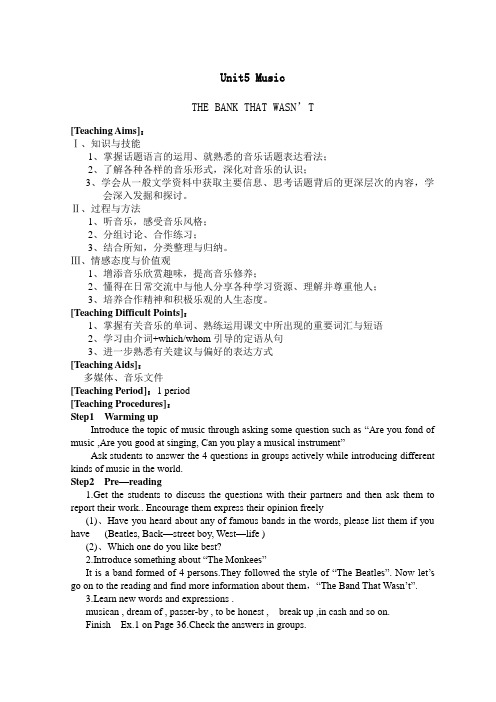
Unit5 MusicTHE BANK THAT WASN’T[Teaching Aims]:Ⅰ、知识与技能1、掌握话题语言的运用、就熟悉的音乐话题表达看法;2、了解各种各样的音乐形式,深化对音乐的认识;3、学会从一般文学资料中获取主要信息、思考话题背后的更深层次的内容,学会深入发掘和探讨。
Ⅱ、过程与方法1、听音乐,感受音乐风格;2、分组讨论、合作练习;3、结合所知,分类整理与归纳。
Ⅲ、情感态度与价值观1、增添音乐欣赏趣味,提高音乐修养;2、懂得在日常交流中与他人分享各种学习资源、理解并尊重他人;3、培养合作精神和积极乐观的人生态度。
[Teaching Difficult Points]:1、掌握有关音乐的单词、熟练运用课文中所出现的重要词汇与短语2、学习由介词+which/whom引导的定语从句3、进一步熟悉有关建议与偏好的表达方式[Teaching Aids]:多媒体、音乐文件[Teaching Period]:1 period[Teaching Procedures]:Step1 W arming upIntroduce the topic of music through asking some question such as “Are you fond of music ,Are you good at singing, Can you play a musical instrument”Ask students to answer the 4 questions in groups actively while introducing different kinds of music in the world.Step2 Pre—reading1.Get the students to discuss the questions with their partners and then ask them to report their work.. Encourage them express their opinion freely(1)、Have you heard about any of famous bands in the words, please list them if you have (Beatles, Back—street boy, West—life )(2)、Which one do you like best?2.Introduce something about “The Monkees”It is a band formed of 4 persons.They followed the style of “The Beatles”. Now let‟s go on to the reading and find more information about them,“The Band That Wasn‟t”.3.Learn new words and expressions .musican , dream of , passer-by , to be honest , break up ,in cash and so on.Finish Ex.1 on Page 36.Check the answers in groups.Step 3 Reading1.SkimmingLet the students listen to the tape and find out the answers to the Ex1 incomprehending.2.Second readingIn this part, students will read the text again and try to understand the sentences and the main idea of each paragraph, and then finish the exercise 2 in Comp rending.Suggested answers:Paragraph 1:Dreaming of being famous musician or singer.Paragraph 2:How musicians form bands.Paragraph 3:How the band got their start.Paragraph 4:How “The Monkees” became serious about their business.3. Language Points FocusFirst ,you find out the sentences which incloud the attributive clasues in the passage.Y ou can work in groups. The winner is the group who finish it first.Then let’s summ up :介词+which / whom 引导的定语从句介词主要由先行词与关系词之间的关系或先行词与从句谓语动词的关系决定。
Unit 5 Music Reading and Thinking 教案人教版高中英语必修第二册
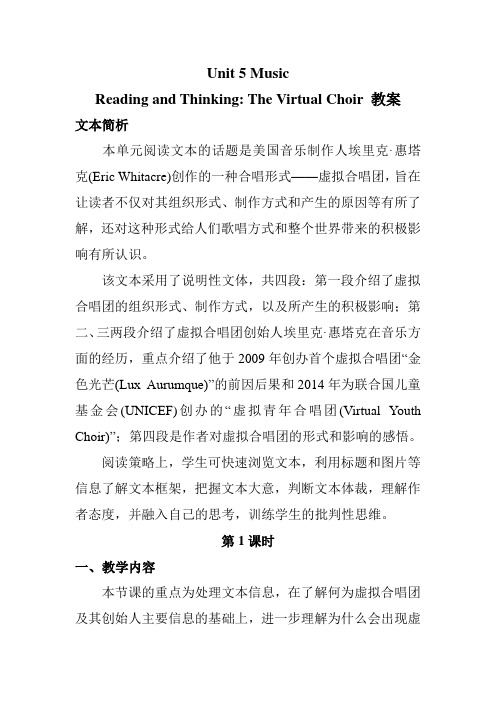
Unit 5 MusicReading and Thinking: The Virtual Choir 教案文本简析本单元阅读文本的话题是美国音乐制作人埃里克·惠塔克(Eric Whitacre)创作的一种合唱形式——虚拟合唱团,旨在让读者不仅对其组织形式、制作方式和产生的原因等有所了解,还对这种形式给人们歌唱方式和整个世界带来的积极影响有所认识。
该文本采用了说明性文体,共四段:第一段介绍了虚拟合唱团的组织形式、制作方式,以及所产生的积极影响;第二、三两段介绍了虚拟合唱团创始人埃里克·惠塔克在音乐方面的经历,重点介绍了他于2009年创办首个虚拟合唱团“金色光芒(Lux Aurumque)”的前因后果和2014年为联合国儿童基金会(UNICEF)创办的“虚拟青年合唱团(Virtual Youth Choir)”;第四段是作者对虚拟合唱团的形式和影响的感悟。
阅读策略上,学生可快速浏览文本,利用标题和图片等信息了解文本框架,把握文本大意,判断文本体裁,理解作者态度,并融入自己的思考,训练学生的批判性思维。
第1课时一、教学内容本节课的重点为处理文本信息,在了解何为虚拟合唱团及其创始人主要信息的基础上,进一步理解为什么会出现虚拟合唱团以及它的出现对人们和社会又产生了什么样的影响。
二、课时目标1. 通过整体阅读活动,获取虚拟合唱团及其创始人的基本信息,并梳理虚拟合唱团的发展历程及其给人类社会带来的正面影响。
2. 通过寻读、细读等阅读活动,总结虚拟合唱团的成因,并深入理解作者要传递的深层含义。
3. 通过梳理文本介绍虚拟合唱团的篇章布局,了解写作特点,为第二课时的仿写做好铺垫。
三、教学过程Activity 1:Activating background knowledge of the virtual choir本活动为实现课时目标1做铺垫。
1. Talk about what a choir is.Q1:What did you see in the video?Q2:What is a choir?2. Talk about whether people can sing together with hundreds of people while they are alone at home.Q:Could you imagine singing together with hundreds of people while you were at home alone?【设计意图】通过课前播放One V oice Children’s Choir的视频,创设情境,引出主题;引导学生根据自身经验给合唱团下定义;通过提问,激活学生背景知识,提升其阅读兴趣。
高中英语人教版必修2Unit 5 Music 教案
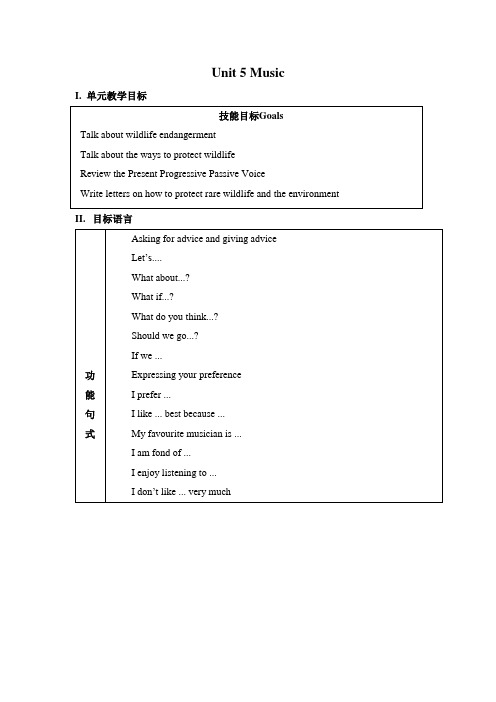
Unit 5 Music I. 单元教学目标II. 目标语言Ⅲ. 教材分析与教材重组1. 教材分析本单元以music为话题,通过对本单元的教学,使学生了解有关的音乐知识,了解乐队The Monkees的形成,表演风格及发展历程,让学生在理解文章,理解音乐的同时,潜移默化培养一种审美的情趣,也会对社会生活,人的思想观,价值观以及人应该追求什么进行思考。
并通过学习一个有趣的寓言故事,侧面了解演员成名后,歌迷给其带来的苦恼;暗示过分痴迷所带来的负面影响。
同时让学生利用目标语言学会表达自己的观点,征询建议及把握介词提前的定语从句的使用;能利用本单元所学知识写e-mail 或短文介绍中国有关的民间音乐。
1.1 Warming up 是听八段不同的音乐,然后与书上的八幅图片相搭配,目的是通过听不同的音乐,让他们了解有关类型的音乐,讨论对于音乐的感受和喜欢听音乐的原因,激发他们对此话的兴趣,带他们进入话题。
1.2 Pre-Reading 提出三个问题,引导学生谈论有名的乐队,尤其是与课文相关的门基合唱组。
在学课文前扩展学生的思维,为学课文做好准备。
1.3 Reading 课文以知名乐队The Monkees的成立和发展为切入点,从通俗音乐的题材,特点,内容以及半个世纪来的发展历程等多个方面介绍了这种音乐艺术形式,并以音乐作为一个侧面反映了近几十年来美国社会和价值观的变化,是一篇涵盖了大量的信息量,同时又可以给学生艺术和思想双重启迪的优美文章。
通俗音乐发展历史悠久,六十年代开始成为美国社会流行音乐主流,节奏强烈,主题鲜明,歌词率真,容易引发人的共鸣,尤其是在喜爱音乐的年轻人中可以产生感官和心灵上的触动。
同时,流行音乐歌曲所负载的是整个社会所接受和追求的一种价值观。
学习这篇课文,学生在理解文章,理解音乐的同时,潜移默化中也在培养一种审美的情趣,也会对社会生活,人的思想观,价值观以及人应该追求什么进行一定的思考。
因此,作为一篇谈论音乐的文章,它提供了较广泛的教学资源拓展空间,它可以博得学生的喜爱,可以使学生有较大的热情积极投入到课堂教学中来,和教师在探究中共同学习。
人教版高中英语必修2《Unit5Music》教案

人教版高中英语必修2《Unit5Music》教案人教版高中英语必修2《Unit 5 Music》教案【一】教学准备教学目标1.知识目标: 1)Students should learn some useful words and phrases: musician, clap, passer-by, form, extra, earn, advertisement, 2 attractive, instrument, loosely, actor dream of, be honest with, play jokes on, or so, break up. 3)Students should understand the general idea of the passage2.语言能力目标:1)Develop the Ss’skills of skimming, scanning and careful reading. 2) Train the Ss to find the key words and the topic sentences. 3)Encourage the Ssto guess the new words according the reading.3.情感态度与文化意识目标:1)Encourage the Ss to share the different kinds of music. 2)Improve the cooperation and share among the students.教学重难点1、教学重点:a.To understudend the passage better b.To find the main idea of each paragraph2、教学难点:a.Master the reading ability b.Develop the skills of reading教学过程教学设计本节课共45分钟,具体教学步骤如下:Step I Leading-in播放一段小视频,内容为歌曲 If you are happy的英文版本,通过介绍演唱乐队twins引出本单元话题。
人教版高一英语必修二《Unit5 Music》说课稿

人教版高一英语必修二《Unit5 Music》说课稿一、教材背景《Unit5 Music》是人教版高一必修二的一篇教材内容,主要围绕音乐这一主题展开。
通过学习本单元,可以帮助学生了解音乐在不同文化中的作用和影响,并培养学生的音乐欣赏能力、口语交际能力和阅读能力。
二、教学目标1. 知识目标•学习并掌握本单元的核心词汇和短语,如composer、genre、instrument等;•理解和掌握本单元的重点短语和句型,如能够运用“Where was he/she born?”、“What kind of music do you like?”等进行口语表达;•了解英语国家和中国的音乐文化差异。
2. 能力目标•培养学生的口语交际能力,能够用正确的语法和词汇表达自己的音乐喜好和观点;•培养学生的阅读理解能力,能够阅读并理解关于音乐的文章;•培养学生的听力理解能力,能够听懂关于音乐的对话和讲述。
3. 情感目标•帮助学生发展对音乐的兴趣和热爱;•培养学生欣赏不同风格音乐的能力,增强跨文化交流的能力;•通过学习音乐,培养学生的审美情操和情感表达能力。
三、教学重难点1. 教学重点•理解并掌握本单元的核心词汇和短语;•进行口语表达,用正确的句型和词汇谈论音乐喜好和观点;•阅读和理解关于音乐的文章。
2. 教学难点•帮助学生理解并掌握不同风格音乐的特点和背景;•培养学生批判性思维,提高阅读和分析音乐文章的能力。
四、教学内容与方法1. 教学内容本单元主要包括以下几个部分:•单词学习和词汇拓展:学习与音乐相关的词汇,如composer(作曲家)、genre(风格)、instrument(乐器)等;•语法学习和句型运用:学习问句和回答的句型,如“Where was he/she born?”、“What kind of music do you like?”;•阅读理解:阅读文章《Music Around the World》,了解不同国家的音乐文化差异;•口语表达:谈论音乐喜好、音乐家和音乐风格,学生进行口头交际。
高中英语必修二Unit5_Music教案
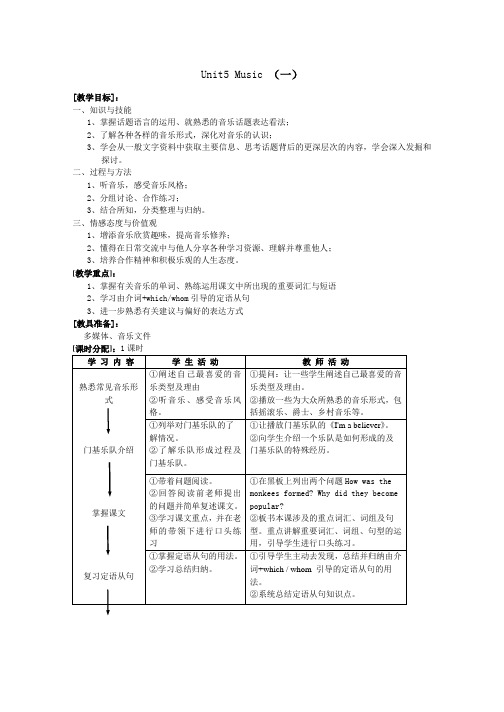
Unit5 Music (一)[教学目标]:一、知识与技能1、掌握话题语言的运用、就熟悉的音乐话题表达看法;2、了解各种各样的音乐形式,深化对音乐的认识;3、学会从一般文字资料中获取主要信息、思考话题背后的更深层次的内容,学会深入发掘和探讨。
二、过程与方法1、听音乐,感受音乐风格;2、分组讨论、合作练习;3、结合所知,分类整理与归纳。
三、情感态度与价值观1、增添音乐欣赏趣味,提高音乐修养;2、懂得在日常交流中与他人分享各种学习资源、理解并尊重他人;3、培养合作精神和积极乐观的人生态度。
[教学重点]:1、掌握有关音乐的单词、熟练运用课文中所出现的重要词汇与短语2、学习由介词+which/whom引导的定语从句3、进一步熟悉有关建议与偏好的表达方式[教具准备]:多媒体、音乐文件[引入新课]:提出问题;同学们最喜爱的音乐类型是什么?理由?[讲解词]:音乐是我们日常生活中表达喜悦、忧伤、幸福、忧愁等诸多情感的媒介,也是大家十分喜爱的艺术形式,要让大家说出自己喜爱的歌手或者音乐家我相信大家一定可以说出好多来。
今天我想和同学们探讨一下,大家平时喜爱的音乐类型,对这些音乐类型的了解和体会,我也很想听听同学们对这些音乐类型的看法,给大家讲讲为什么喜欢这种音乐类型?(选若干同学们回答)(适当总结学生所讲)同学们对所喜爱的音乐类型理由的阐述也是各有道理,所谓萝卜白菜各有所爱,每个人都有自己独特的个人喜好,对音乐类型的偏好也是如此。
也许某一天你们之中有人会成为音乐家,或者有人会成立乐队,给大家带来好听的音乐作品,丰富大家的精神生活。
[讲授新课]:一、介绍门基乐队[提出问题]:同学们有没有听过门基乐队?门基乐队有哪些作品?[学生讨论]:对门基乐队的了解。
门基乐队是一只美国本土乐队,由四人组成,于二十世纪60年代兴起,最初,乐队成员是应一则电视广告走到一起的。
主要作品有《Waiting For The Sun》、《The Unknown Soldier》、《The Soft Parade》、《Morrison Hotel》[运用教具]:播放门基乐队的《I'm a believer》给学生听,使他们亲耳感受门基乐队的风格特点。
Unit5Music教案-高一英语人教版必修第二册
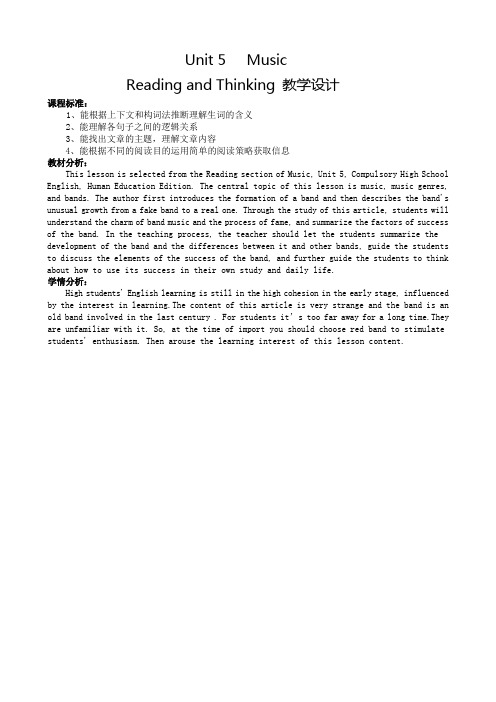
Unit 5 MusicReading and Thinking 教学设计1、能根据上下文和构词法推断理解生词的含义2、能理解各句子之间的逻辑关系3、能找出文章的主题,理解文章内容4、能根据不同的阅读目的运用简单的阅读策略获取信息This lesson is selected from the Reading section of Music, Unit 5, Compulsory High School English, Human Education Edition. The central topic of this lesson is music, music genres, and bands. The author first introduces the formation of a band and then describes the band's unusual growth from a fake band to a real one. Through the study of this article, students will understand the charm of band music and the process of fame, and summarize the factors of success of the band. In the teaching process, the teacher should let the students summarize the development of the band and the differences between it and other bands, guide the students to discuss the elements of the success of the band, and further guide the students to think about how to use its success in their own study and daily life.High students' English learning is still in the high cohesion in the early stage, influenced by the interest in learning.The content of this article is very strange and the band is an old band involved in the last century . For students it’s too far away for a long time.They are unfamiliar with it. So, at the time of import you should choose red band to stimulate students' enthusiasm. Then arouse the learning interest of this lesson content.Unit 5 Music--The virtual choir Reading and Thinking 教学设计To learn about experiencing music online.To scan and circle the information in the text.To find the numbers and dates to fill in the timeline.To learn more about music by completing the sentences with the correct forms of thephrases.Andphrases.And then make a mind map about the outline of the passage.To know the music about different choirs and improve the quality of music.1.To guide students to pay attention to reading strategies,such as prediction,self-questioning and scanning.2.To help students sort out the main meaning of each paragraph and understand the narrative characteristics of "timeline”in illustrative style.3.To lead students to understand the changes that have been caused by the Internet.Cooperative learning1.Search the Internet to get more information about the virtual choir.2.Write a summary about the music refer to the virtual choir.Unit 5 Music-The virtual choirReading and ThinkingThe main idea:paragraph1:the definition (what)--definition and significance paragraph2:the founder(who)--Eric Whit acre paragraph3:the creation(how) paragraph4:the developmentparagraph5:the influence(what)--a wonderful way and a better placeBook 2 Unit 5 MusicDiscover useful structures 教学设计《英语课程标准》对于语法的要求:高中阶段英语语法知识的学习是义务教育阶段语法学习的延伸和继续,应在更加丰富的语境中通过各种英语学习和实践活动进一步巩固和恰当运用义务教育阶段所学的语法知识,学会在语境中理解和运用新的语法知识,进一步发展英语语法意识。
人教版高中英语必修第二册 《Unit 5 Music》教案
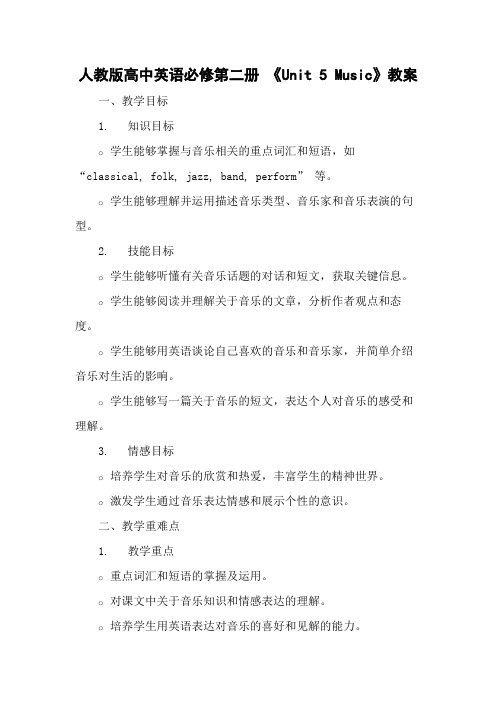
人教版高中英语必修第二册 《Unit 5 Music》教案一、教学目标1.知识目标o学生能够掌握与音乐相关的重点词汇和短语,如 “classical, folk, jazz, band, perform” 等。
o学生能够理解并运用描述音乐类型、音乐家和音乐表演的句型。
2.技能目标o学生能够听懂有关音乐话题的对话和短文,获取关键信息。
o学生能够阅读并理解关于音乐的文章,分析作者观点和态度。
o学生能够用英语谈论自己喜欢的音乐和音乐家,并简单介绍音乐对生活的影响。
o学生能够写一篇关于音乐的短文,表达个人对音乐的感受和理解。
3.情感目标o培养学生对音乐的欣赏和热爱,丰富学生的精神世界。
o激发学生通过音乐表达情感和展示个性的意识。
二、教学重难点1.教学重点o重点词汇和短语的掌握及运用。
o对课文中关于音乐知识和情感表达的理解。
o培养学生用英语表达对音乐的喜好和见解的能力。
2.教学难点o如何帮助学生准确运用丰富的词汇和句型描述音乐。
o引导学生深入理解音乐的内涵和价值。
三、教学方法1.视听教学法:通过播放音乐、视频等让学生直观感受音乐的魅力。
2.讨论交流法:组织学生讨论音乐相关话题,促进学生思维碰撞和语言表达。
3.情景创设法:创设音乐场景,让学生在情境中学习和运用语言。
四、教学过程(一)导入(5 分钟)1.播放一段不同类型的音乐片段,如古典音乐、流行音乐、摇滚音乐等。
2.提问学生:What kinds of music do you hear? How do they make you feel?(二)词汇教学(10 分钟)1.展示本单元的重点词汇和短语,结合音乐实例进行讲解。
2.开展词汇游戏,如音乐词汇猜猜猜,加强学生对词汇的记忆和理解。
(三)阅读前准备(5 分钟)1.让学生观察课文标题和图片,预测文章内容。
2.提出一些引导性问题,如:What do you think thepassage will be about music?(四)课文阅读(15 分钟)1.学生快速阅读课文,概括文章的主要内容。
高中英语必修二unit5-music-阅读教案
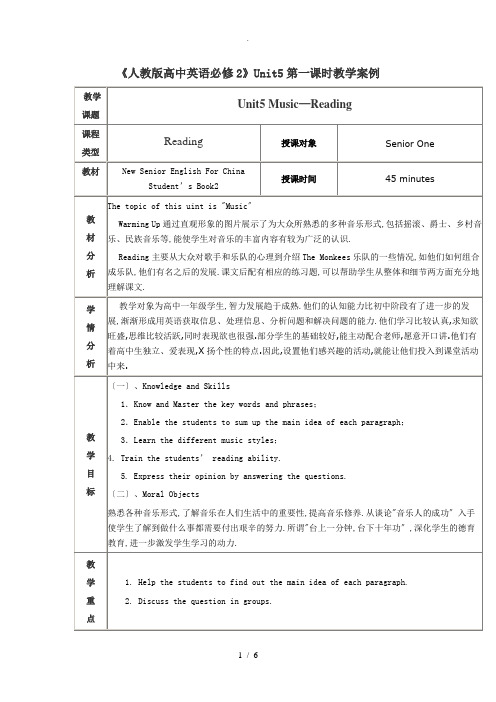
《人教版高中英语必修2》Unit5第一课时教学案例教学步骤一.Warming up——5minutes1. Attract students’ attentionPlay the song SUGAR. Talk about the "Importance of music〞with students to attract students’attention to the learning content, especially to mention the kind of music "Pop〞. Then lead students to the textbook on page34.2.Show picturesShow students some pictures about music styles and ask them to say something about theiropinions of different music.设计目的:放歌引出话题,可以吸引大家的注意力从而引导他们进入音乐这个课题,这样可以引起他们对该单元内容的兴趣并可以自然而然地引入到课文阅读.二.Pre-reading——8minutesTask one:Discussion and TalkingFour students in one group to discussionGive students some questions ask them to speak out1.Do you want to be famous?2.Please list the three steps of success.3.Do you know anything about the Monkees?设计目的:把学生分小组讨论有利于学生的合作学习能力的提高,这些问题起到过渡作用,能够顺利地进入到接下去的阅读阶段.三.While reading——20minutes。
人教版高中英语必修二Unit5 Music-Reading for Writing教案

2019新人教高中英语必修二Unit5Music-Reading for writing公开课教案Analysis of the materials:1. What- Theme: Write a speech on how music changed your life.- Thematic Context: Man and self-Main content: A speech shares a personal story about how music changed people’s life.2. WhyAuthor’s intention:to inform readers of the positive influence of music on our daily life;to inspire readers to draw energy and power from music;to draw readers’ attention to relationship between music and personal life.Value Orientation:Thematic Meaning: Exploring the power of music, live a passionate life.3. HowText type: practical writing - speechLanguage features:the language is concise and touching. By using rhetorical devices, transitional words and contrastive words, it’s not difficult for students to summarize the structure, learn its writing techniques, imitate it and apply some into practical writing.Teaching aims:1. Get students to have a good understanding of what a speech is and how to write a speech.2. Enable students to use some writing skills flexibly.3. Develop student’s writing and cooperating abilities.Teaching key and difficult points:1.Enable students to analyze the organization and language features of a speech and learn how to write a good speech.2.Enable students to write an effective speech.Teaching procedures:StepⅠWarming upPlay a video of a speech for students to watch.StepⅠReading for informationRead the speech and answer the questions.1.What was Sarah’s problem?2.How did music help her during her difficult time?3.What is her advice to others?Suggested answers:1.Sarah had a serious disease that was difficult to cure.2.It made her feel much better and helped her recover.3.Her advice to others is to use music to help when they have problems.StepⅠ Reading for structureRead the speech again and figure out the structure.Suggested answers:Part 1Greeting Introduce yourself Introduce the topicPart 2(body)Tell your story State your opinionPart 3(Closing the speech)Give your advice Summarize your speechPart 4Thank your audienceStepⅠReading for language featuresActivity 1Match the names of rhetorical devices to the lettered sentences in the speech.Metaphor______________________________Personification__________________________________Quote________________________________Repetition_________________________________rhetorical question_________________________________Simile_______________________________Suggested answers:metaphor E personification F quote Brepetition C rhetorical question A simile DActivity 2Further learn about rhetorical devices.(1):It is a question that isn’t meant to get an answer,but is asked to make a point.E.g.Have you ever faced a difficult time?(2):A thing,an idea or an animal is given human features.E.g.The city of Wuhan cries.(3):To quote is to repeat a short passage,word,phrase,or sentence that came from somewhere or someone else.E.g.As Longfellow says,“Music is the universal language of mankind.”(4):It refers to the use of the same word or phrase in a poem,a speech,etc.E.g.I came,I saw,I conquered.(5):A simile compares two things by using words such as “like” or “as”.E.g.John is as cunning as a fox.(6):Metaphor is when you use two nouns and compare them to one another.Unlike simile,you don’t use “ like” or “as” in the comparison.E.g.As a soldier,you can’t be a mouse.You have to be a tiger.Suggested answers:(1)Rhetorical question(设问)(2)Personification(拟人)(3)Quote(引用)(4)Repetition(重复)(5)Simile (明喻)(6)Metaphor(隐喻)Activity 3Read the following poem and find out the sentences that use rhetorical devices.If you want to be a...If you want to be a spy like James Bond 007,you need to be as cool as a cucumberand as sly as a foxand you need cast-iron nerves.If you want to be a model,you need to be as tall as a treeand eat like a bird.If you want to be an actorand a martial arts expert like Jackie Chan,you cannot be a weed.If you want to be successful like Bill Gates,you need to have a mind like a computerand be as sharp as a spear in business.If you want to be a magician like David Copperfield.you need to make people see that blackis white and white is black.If you want to succeed in life,you need to be as hungry as a lion.Suggested answers:Simile/repetition:You need to be as cool as a cucumber and as sly as a fox.You need to be as tall as a tree and eat like a bird.You need to have a mind like a computer and be as sharp as a spear in business.You need to be as hungry as a lion.Metaphor:You cannot be a weedStepⅠPreparing for writingWork in groups.Think of ways that people experience music and how music can help people.(红色部分为学生作答)Ways people experience music How music can help peoplesinging(in a choir)•give encouragement •provide joy •express emotions ...listening to a piece of music or a song •share similar feelings •bring about happiness •make listeners strong in mind ...playing the piano/guitar/guqin...•express feelings from heart •imagine a dream world •have fun...StepⅠ Writing a speechActivity 1Complete the outline and use it along with rhetorical devices to draft your speech.•Introduce yourself.•Write about how music made you/him/her feel.•Give the topic of your speech.•Relate your/his/her experience to the audience.•Write about your experience with music,or the experience of someone you know.•Close the speech.Hello, my name is,and I’m here to talkabout .years ago,__________________________________________________________________ Suggested answer:Answers may vary.This is one of the versions.Hello,my name is Jane,and I’m here to talk about how music influenced my father’s life.Have you ever encountered a time when everything went wrong and you were discouraged?Five years ago,my father was diagnosed to develop a serious disease,which was hard to cure.It seemed as if the world was at an end.The doctor suggested that we should keep calm and help my father fight with the disease bravely.He also advised my father to listen to music often.Just as Walter Haddon once said,“Music is the medicine of a troubled mind.” My father followed the doctor’s advice and listened to soft music from time to time.Music gave my father encouragement,music gave my father strength and music gave my father confidence.Music became my father’s best friend,helping him get through the hardest time.I do hope none of you have to meet with tough times in your life.In case you come across the same situation,I advise you to turn to music,for it does help.Thank you for listening.Activity 2Exchange drafts with your e the checklist to help you revise the draft.√Does the writer explain how music has changed his/her/someone else’s life?√Are some of the rhetorical devices included and used properly?√Does the writer talk about how music makes him/her/someone feel?√Is the first word in each sentence capitalized?√Does the writer use correct punctuation?StepⅠ HomeworkRequired: Polish your speech writing according to the suggestions given by your partners.Optional:1. Select one piece of music as the BGM of your speech.2. Practice your speech skills for a better performance.教学反思:本节课总体上实现了教学目标,学生都能有很完整的演讲习作生成,并能将本课难点修辞手法攻克。
高中英语 Unit 5 Music教案必修2
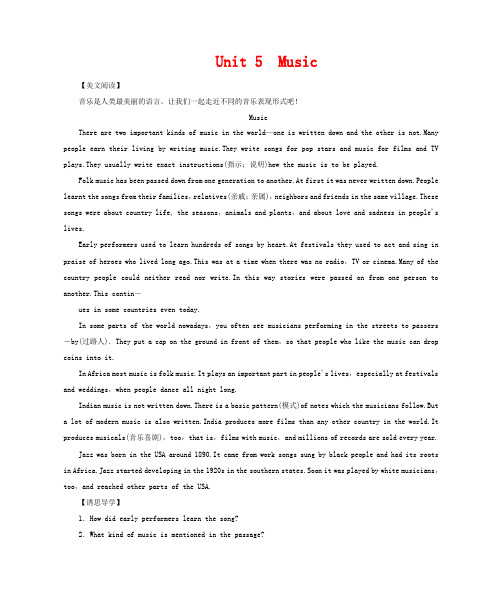
Unit 5 Music【美文阅读】音乐是人类最美丽的语言。
让我们一起走近不同的音乐表现形式吧!MusicThere are two important kinds of music in the world—one is written down and the other is not.Many people earn their living by writing music.They write songs for pop stars and music for films and TV plays.They usually write exact instructions(指示;说明)how the music is to be played.Folk music has been passed down from one generation to another.At first it was never written down.People learnt the songs from their families,relatives(亲戚;亲属),neighbors and friends in the same village.These songs were about country life, the seasons,animals and plants,and about love and sadness in people's lives.Early performers used to learn hundreds of songs by heart.At festivals they used to act and sing in praise of heroes who lived long ago.This was at a time when there was no radio,TV or cinema.Many of the country people could neither read nor write.In this way stories were passed on from one person to another.This contin-ues in some countries even today.In some parts of the world nowadays,you often see musicians performing in the streets to passers -by(过路人).They put a cap on the ground in front of them,so that people who like the music can drop coins into it.In Africa most music is folk music.It plays an important part in people's lives,especially at festivals and weddings,when people dance all night long.Indian music is not written down.There is a basic pattern(模式)of notes which the musicians follow.But a lot of modern music is also written.India produces more films than any other country in the world.It produces musicals(音乐喜剧),too,that is,films with music,and millions of records are sold every year.Jazz was born in the USA around 1890.It came from work songs sung by black people and had its roots in Africa.Jazz started developing in the 1920s in the southern states.Soon it was played by white musicians,too,and reached other parts of the USA.【诱思导学】1.How did early performers learn the song?2.What kind of music is mentioned in the passage?【答案】 1.They learn hundreds of songs by heart.2.Folk music,Indian music and Jazz.Period ⅠPreviewing(教师用书独具)●教学目标本课时主要是通过学生对学案所给出的内容的学习,理解本课文中所出现的词汇,初步了解课文以及相关的背景知识,对下一堂课对课文的全面理解起到一个铺垫作用。
高中英语 Unit 5 Music教案 新人教版必修2

必修2英语同步教案Unit 5 MusicPart One: Teaching Design (第一部分:教学设计)Period 1: A sample lesson plan for reading(THE BAND THAT WASN’T)Aims◆To learn to talk about kinds of music◆To learn to read about bands◆To study The Attributive Clause (in/ for/ with/ by+which/ whom)◆To learn to write an e-mailProceduresI. Warming upWarming up by describingGood morning, class. Today we are going to talk about an interesting topic --- music. As we know, music is a kind of art of making pleasing combinations of sounds in rhythm, harmony and counterpoint. Music can produce a lively and happy atmosphere and bring people relaxation after hard work, which can reduce the tiredness. Listening to music also makes people feel happy and nice. How many do you know about music? Can you tell about different kinds of music? Now turn to page 33, look at the pictures, read the captions and listen to the different kinds of music. See if you can guess which music matches with which picture.Warming up by discussingHi, everyone. Do you like music? How much do you know about music? Can you tell about the different kinds of music? Please turn to page 33. Look at the pictures. Let’s listen to some music. Let’s see if you can guess which music matches with which picture.Classical music Country music Rock ‘n’ RollRap Orchestra Folk musicYes, you are right. I’m sure you will really enjoy yourselves after listening to all these beautiful music. What kind of music do you like better, Chinese or Western, classical or modern? Why? How does music make you feel? Why do you like to listen to music? Let’s discuss these questions in small groups. Try to share your opinions with one another.II. Pre-reading1.Thinking and sayingHave you heard about any of the famous bands in the world? List some if you can.Let’s listen to some pieces of music from different bands. Work in groups of four. Tell your group mates which band you like best. Why? Then the group leader is to stand up and share the group idea with the class.1.Reading aloud to the recordingNow please listen and read aloud to the recording of the text T HE BAND THAT WASN’T. Pay attention to the pronunciation of each word and the pauses within each sentence. I will play the tape twice and you shall read aloud twice, too.2.Reading and underliningNext you are to read and underline all the useful expressions or collocations in the passage. Copy them to your notebook after class as homework.Skim the text and identify the topic sentence of each paragraph. You may find it either at the beginning, the middle or the end of the paragraph.Read the text again to complete the tables, which list how people formed a band and how The Monkees was formed by the TV organizers and became a real band.How do people get to form a band?The Monkees in 1968 (left to right): Micky Dolenz, Peter Tork, MikeNesmith & Davy JonesAs you have read the text times, you can surely tell which sentences are difficult to understand. Now put your questions concerning the difficult points to me.IV. Closing downClosing down by doing exercisesTo end the lesson you are to do the comprehending exercises No. 1, 2, 3 and 4.Closing down by having a discussionDo you think the TV organizers were right to call “The Monkees ” a band when they did not sing or write their own songs? Why?I shall write some key words and expressions on the board. You are to retell the form of the band according to these words.必修2英语同步教案Unit 5 MusicPeriod 2: A sample lesson plan for Learning about Language(The Attributive Clause (in/ for/ with/ by+which/ whom).AimsTo help students learn about the Attributive Clause with a preposition in front.To help students discover and learn to use some useful words and expressions.To help students discover and learn to use some useful structures.ProceduresI. Warming upWarming up by discovering useful words and expressionsTurn to page 35 and do exercises No. 1, 2 and 3 first. Check your answers against your classmates’. II. Learning about grammar1.Reading and thinkingTurn to page 34 and read with me the text of THE BAND THAT WASN’t. As you read on, pay attention to The Attributive Clause (in/ for/ with/ by+which/ whom), that is, the attributive clauses with a preposition ahead of the relative pronoun shown in the sentences.Turn to page 34. Look at the two sentences:The musicians of whom the band was formed played jokes on each other as well as played music. However, after a year or so in which they became more serious about their work, “The Monkees”started to play their own instruments and write their own songs like a real band.Pay attention to the structure: preposition + relative pronoun. Usually only two relative pronouns --- which and whom--- can be used in the Attributive Clause, with a preposition put before the clause. That can’t be used. Look at the screen. Here are more examples on this kind of structure.Now go on to do Exercise No. 2 on page 36, that is, to sort out the sentences.III. Ready used materials for The Attributive Clause (in/ for/ with/ by+which/ whom)In formal styles we often put a preposition before the relative pronouns which and whom:∙The rate at which a material heats up depends on its chemical composition.∙In the novel by Peters, on which the film is based, the main character is a teenager.∙An actor with whom Gelson had previously worked contacted him about the role.∙Her many friends, among whom I like to be considered, gave her encouragement.Notice that after a preposition you can’t use who in place of whom, and you can’t use that or zero relative pronoun either:∙Is it right that politicians should make important decisions without consulting the public to whom they are accountable? (not --- the public to who they are accountable.)∙The valley in which the town lies is heavily polluted. (not --- The valley in that the town...) ∙Arnold tried to gauge the speed at which they were traveling. (not --- the speed at they were traveling.)In informal English we usually put the preposition at the end in attributive clauses rather than at the beginning:∙The office which Graham led the way to was filled with books.∙Jim’s footballing ability, which he was noted for, had been encouraged by his parents.∙The playground wasn’t used by those children who it was built for.In this case we prefer who rather than whom (although whom is used in formal contexts). In restrictive attributive clauses we can also use that or zero relative pronoun instead of who or which (e.g. ...the children (that) it was built for).If the verb in attributive clauses is a two-or-three-word verb (e.g. come across, fill in, go through, look after, look up to, put up with, take on) we don’t usually put the preposition at the beginning:∙Your essay is one of those (which/that) I’ll go through tomorrow. (rather than...through which I’ll go tomorrow.)∙She is one of the few people (who/that) I look up to. (not ... to whom I look up.)In formal written English, we often prefer to use of which rather than whose to talk about things:∙A huge amount of oil was spilled, the effects of which are still being felt. (or...whose effects are still being felt.)∙The end of the war, the anniversary of which is on the 16th of November, will be commemorated in cities throughout the country. (or...whose anniversary is on...)Note that we can’t use of which in place of whose in the patterns described in Unit 71B:∙Dorothy was able to switch between German, Polish and Russian, all of which she spoke fluently. (not..,all whose she spoke...)We can sometimes use that...of in place of of which. This is less formal than of which and whose, and is mainly used in spoken English:∙The school that she is head of is closing down. (or The school of which she is head...) Whose can come after a preposition in attributive clauses. However, it is more natural to put the preposition at the end in less formal contexts and in spoken English:∙We were grateful to Mr. Marks, in whose car we had traveled home. (or...whose car we had traveled home in.)∙I now turn to Freud, from whose work the following quotation is taken. (or...whose work the following quotation is taken from.)IV. Closing down by doing exercises:Join the sentence halves using which or whom after an appropriate preposition. (A)a.I would never have finished the work.b.It was primarily written.c.We know nothing.d.They got a good view.e.He learned how to play chess.f.Dennis scored three goals in the final.g.She was born.h.It was discovered.1.They climbed up to the top of a large rock.2. I would like to thank my tutor.3. She has now moved back to the house on Long Island.4. The star is to be named after Patrick Jenks.S. This is the ball.6. He is now able to beat his father.7. The book is enjoyed by adults as well as children.8. There are still many things in our solar system.them and give alternatives if you can. (A)I. It's a piece of jewelry across which I came in an antique shop. --- which I came across in an antique shop. (‘came across’ is a two-word verb.)2. The extra work which she took on was starting to affect her health.3. My mother, after whom I looked for over 20 years, died last year.4. The people whom I work with are all very friendly.5. Some of the criticisms with which they had to put up were very unfair.6. He had many friends with whom he had a regular correspondence.7. The woman to who he is engaged comes from Poland.8. The forms which I had to fill in were very complicated.Rewrite these sentences so that they are more appropriate for formal written English. Use preposition + which or preposition + whose, as appropriate. (B)I. Tom Sims, whose car the weapons were found in, has been arrested. Torn Sims, in whose car the weapons were found, has been arrested.2. Tom Ham, whose novel the TV series is based on, will appear in the first episode.3. Dr Jackson owns the castle whose grounds the main road passes through.4. Tessa Parsons is now managing director of Simons, the company that she was once a secretary in.5. Allowing the weapons to be sold is an action that the Government should be ashamed of.6. The dragonfly is an insect that we know very little of.。
高一英语(人教版)-必修二 Unit 5 Music (2)-1教案

高一英语(人教版)-必修二 Unit 5 Music(2)-1教案教案教学基本信息:课题:虚拟合唱团学科:英语教材:人教版高一英语必修二Unit 5 Music (2)教学设计参与人员:设计者、实施者、指导者、课件制作者、其他参与者教学目标及教学重点、难点:重点:获取梳理文中作者所提供的有关虚拟合唱团的事实性信息;概括整合虚拟合唱团的关键特征并与真实合唱团进行比较;难点:以思维导图的形式梳理文章篇章结构并分析作者的态度;结合生活谈论自己对虚拟合唱团的看法和观点。
教学过程:教学环节主要教学活动设置意图导入话题 - 激活学生的已知 - 引出本课主题教师创设情境,导入话题:为什么人们需要音乐?人们如何体验音乐?电脑和网络如何帮助我们体验不同的音乐。
预读 - 预测文章大意 - 研究生词教师介绍文章标题《The Virtual Choir》,学生根据文章标题和插图,预测文章大意,并解释生词。
整体阅读 - 确认文章大意 - 梳理文章结构学生通读全文,梳理文章大意,并梳理文章结构。
细节阅读 - 获取事实性信息 - 概括关键特征学生细读文章,获取有关虚拟合唱团的事实性信息,并概括整合虚拟合唱团的关键特征。
比较分析 - 比较虚拟合唱团与真实合唱团 - 分析作者态度学生比较虚拟合唱团与真实合唱团的不同点,并分析作者的态度。
拓展讨论 - 结合生活谈论观点 - 思维导图梳理文章结构学生结合生活谈论自己对虚拟合唱团的看法和观点,并以思维导图的形式梳理文章结构。
教案教学基本信息:课题:虚拟合唱团学科:英语教材:人教版高一英语必修二Unit 5 Music (2)教学设计参与人员:设计者、实施者、指导者、课件制作者、其他参与者教学目标及教学重点、难点:重点:获取关于虚拟合唱团的事实性信息;概括整合虚拟合唱团的关键特征并与真实合唱团进行比较;难点:以思维导图的形式梳理文章篇章结构并分析作者的态度;结合生活谈论自己对虚拟合唱团的看法和观点。
2019统编人教版高中英语必修第二册unit 5《Music》全单元教案教学设计
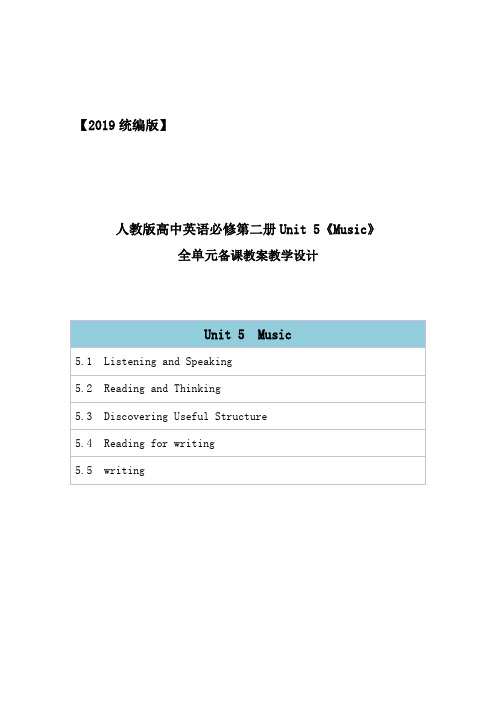
【2019统编版】人教版高中英语必修第二册Unit 5《Music》全单元备课教案教学设计Unit 5 MusicListening and Speaking【教学目标】1. Instruct students to get main facts by listening and motivate them to talk about the topics about music, the types of music, and how the music makes them feel.2. Develop students’ sense of cooperative learning and individual thinking capability.3. Develop students’ different listening skills to solve different listening comprehensive problems.4. Help students to understand how to use the structures “past participle as adverbial”.【教学重难点】Prompt students to talk about the related topics, such as types of music they know, their favourite type of music, how music makes them feel, and how to use past participle as adverbial.【教学过程】Step 1 Lead inThe teacher is advised to talk with their students about music.Boys and girls, before we listen, let’s work in pairs and discuss what type of music you know.Which type is your favorite? How does it make you feel? Share your ideas with partners.I know Chinese traditional music/classical music/country music/hip-hop/jazz/pop music/Latin music/rap/rock/punk…I like classical music. It makes me feel full of energy and happy.Step 2: PredictionAfter their small talk, the teacher can move on by finishing the following task: See the pictures and give the correct answers.1. What are the people doing in the picture below?2. Match the pictures with the correct types of music.A. Chinese traditionalB. classicalC. country musicD. hip-hop1_______________2_______________3_______________4_______________Step 3: Summary of the main ideaListeningI. Play the radio about The Sound of Music (音乐之声), and let students finish the following tasks.A star has come out to tell me1.___________________ to goBut deep in the dark-green shadowsAre voices that urge me to staySo I pause and I wait and I listenFor one more sound for one more lovely thing2.___________________ might say…The hills are alive with the sound of musicWith songs they have sung 3.__________________The hills fill my heart with the sound of musicMy heart 4.__________________ every song it hearsMy heart wants to beat like the wings of the birds that rise from the lake to the treesMy heart wants to sigh like the chime that flies from a church on a breezeTo laugh like a brook 5.__________________ and falls over stones in its wayTo sing through the night like a lark who is 6._____________I go to the hills when my heart is lonelyI know I will hear what I’ve heard beforeMy heart will 7.______________ the sound of musicAnd I’ll sing once moreII. The reporter paraphrased some of the answers the students gave him. Listen to the interviews again and complete the sentences with the words you hear.1. A: Country music touches my heart.B: So you like music that’s _______of _______?2. A: When I listen to hip-hop, I just have to move!B: So it makes you want to _______?3. A: Classical music makes me feel like I’m sitting beside a quiet stream and enjoying nature.B: So to you, it’s _______ and _______?Learning new wordsList the new words in the lesson, tell students the meaning of these words and give some examples.News words: classical, energy, soul…Talking projectGuide students to do speaking practice.I. Talk in pairs. Interview each other about music. Use the picture below for ideas.A: What kind of music do you like?B: I like techno music.A: What makes it so special to you?B: I like to listen to it when l exercise. It gives me energy.II. Work in pairs or groups and role play a conversation.●Suppose you are a reporter and interviewing the students who about music.➢I like to…➢Chinese traditional song/classical music/hip-hop music/country music…➢Listen to/play/sing…Unit 5 MusicReading and Thinking【教学目标】1. To acquire the basic usage of the new words and express concerning how computers and the Internet help us experience music.2. Enable students to understand the main information and text structure of the reading text.3. Enable students to understand past participle as adverbial.【教学重难点】1. Guide students to pay attention to reading strategies, such as prediction, self-questioning and scanning.2. To talk about the advantages and disadvantages of being a member of virtual choir.3. Lead students to understand past participle as adverbial;【教学过程】Step 1 PredictionAsk students the question.How can computers and the Internet help us experience music differently?Step 2: Learning new wordsLearn words:perform,enable,prove,award,and fall in love with…New words practiceIn order to have a good _______________ (perform), I have made good preparations for it.At present, developing the ___________ (able) of the students is an important task in our daily teaching activity.Step 3: Learning sentence patternsIntroduce the sentence patterns in the lesson and give some examples and explanation1. as 引导定语从句,意为“正如,正像”2. 过去分词(短语)作状语as引导定语从句的常用句式有:as is known to all 众所周知as we all know我们都知道as we can see正如我们所看到的as is reported正如报道的as is often the case这是常有的事as is mentioned above如上所述Step 4: Fast reading tasksGuide student to read the article quickly, teach some reading skills and do some exercises.Task of the first fast reading:Read quickly and figure out the key words of each paragraph.•Paragraph 1: enable•Paragraph 2: award•Paragraph 3: performanceTask of the second fast reading:1. What is mainly discussed in this passage?2. Which paragraph mentions background information about the virtual choir?3. Which paragraph mentions the conclusion of the virtual choir?Step 5: Careful reading tasksGuide student to read the article carefully and do some exercises.1. What is the attitude towards the virtual choir?2. Why does the virtual choir prove to be a good influence on the lives of many people?3. If you want to take part in a virtual choir, you need….Step 6: Study reading tasksAnalyze two difficult sentences in the text.1. Imagine having the opportunity to sing together with hundreds of other people while you are at home alone.2. A virtual choir enables them to add their voices to those of other individuals and become part of the global community.Step 7 Homework:Review what we have learned and find out the key language points in the text.Unit 5 MusicDiscovering Useful Structure【教学目标】1. Get students to have a good understanding the basic usage of past word segmentation as past segmentation as predicative and adverbial.2. Strengthen students’ great interest in grammar learning.3. Instruct students to express their ideas with this grammar correctly.【教学重难点】How to enable students to use the structure and meaning of past word segmentation as past segmentation as predicative and adverbial.【教学过程】Step 1 Lead-inGive some messages and ask students to guess who she is.英语过去分词的句子。
- 1、下载文档前请自行甄别文档内容的完整性,平台不提供额外的编辑、内容补充、找答案等附加服务。
- 2、"仅部分预览"的文档,不可在线预览部分如存在完整性等问题,可反馈申请退款(可完整预览的文档不适用该条件!)。
- 3、如文档侵犯您的权益,请联系客服反馈,我们会尽快为您处理(人工客服工作时间:9:00-18:30)。
必修二unit5-music-阅读教案
《人教版高中英语必修2》Unit5第一课时教学案例
学情分析
教学对象为高中一年级学生,智力发展趋于成熟。
他们的认知能力比初中阶段有了进一步的发展,渐渐形成用英语获取信息、处理信息、分析问题和解决问题的能力。
他们学习比较认真,求知欲旺盛,思维比较活跃,同时表现欲也很强。
部分学生的基础较好,能主动配合老师,愿意开口讲。
他们有着高中生独立、爱表现,张扬个性的特点。
因此,设置他们感兴趣的活动,就能让他们投入到课堂活动中来。
教学目(一)、知识和能力目标
1.通过阅读课文和完成所给的任务,能使用本课重点的词汇对课文作出简单复述;
2.能够说出世界音乐的种类;
3.能够简单运用速读、跳读、精读阅读文章(二)、情感目标
教学步骤一.Warming up(热身)——5minutes
1. Attract students’ attention
Play the song Knocking On Heaven’s Door about the “I am a singer”with students which quite famous during this time to attract students attention to the learning content, especially mention the kind of music “Rock ‘n’roll
lead students to the textbook on page33.
2.Show pictures
Show students those pictures in the textbook
音乐这个课题,这样可以引起他们对该单元内容的兴趣并可以自然而然地引入到课文阅读。
二.Pre-reading(读前)——8minutes
Task one:Discussion and Talking
Four students in one group to discussion
Give students some questions ask them to speak out 1.Do you know any famous bands? List some if you do.
2.Which one do you like best? Why?
3.Do you know anything about the Monkees?
设计目的:把学生分小组讨论有利于学生的合作学习能力的提高,这些问题起到过渡作用,能够顺利地进入到接下去的阅读阶段。
Reading the passage quickly and do the exercise1 in page 35.
Task three: intensive reading
record in 1996
was accepted. 2. Most musicians get
together and
but reunited in the mid-1980s. 3. They played an
advisement in the
newspaper looking
for four rock
musicians.
formed a band because they like to write and play music. 4. The first TV show
to celebrate their time as a band.
5. However, the band
broke up about 1970,
was a big hit.
4
Reading the passage the second time carefully and do the exercise2 in passage 35.
Task three: discussion
After reading the passage, thinking and answer the following two questions:
1.Do you think the TV organizers were right to call the Monkees a band when they did not write or sing their own songs? Give reasons.
2.In your opinion, what is the most important thing for a successful a band? Why?
设计目的:分别设计略读和精度可以帮助学生对文章从大致意思到具体内容准确的有把握,从而精准地理解课文内容,也帮助他们练习这种阅读方法。
而小组讨论和表达可以帮助提高学生的口头表达能。
